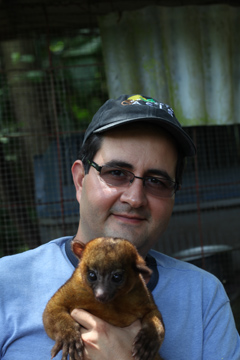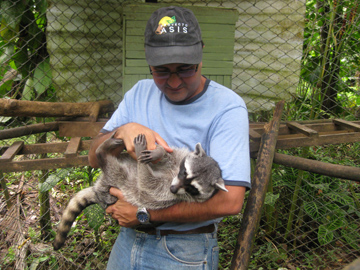An interview with Alvaro del Castillo, director of Proyecto Asís in Costa Rica
While Costa Rica is lauded for its conservation ethic, environmental concerns remain in the country. Overdevelopment is tied to many issues, including pollution, degradation of ecosystems, deforestation, and soil erosion, while unsustainable fishing plagues coastal waters. Costa Rica’s wildlife is also directly affected by hunting as crop and livestock pests, predation and displacement by introduced species, and the illegal pet trade.
 Alvaro del Castillo with a young kinkajou |
Many NGOs are working to address these issues. Most rely on direct donations. An exception is Proyecto Asís, a group that has developed a community outreach and environmental education program to reduce the number of animals injured, orphaned, and kept illegally as pets in the area around Arenal, a popular tourist destination. Instead of soliciting funds from donors, Proyecto Asís is largely dependent on revenue from its Spanish school and volunteer program. Both programs offer visitors unique learning opportunities and immersion in Costa Rican culture via homestays with local families.
Alvaro del Castillo, the project’s director, says Proyecto Asís, “deepens the cultural awareness of visitors, creating a more environmentally conscious global citizen.” At the same time the initiative fosters greater awareness of environmental issues among local school children and communities.
During a March visit to Proyecto Asís, mongabay.com caught up with del Castillo to learn more about the project and its mission.
Mongabay: What is the function of Proyecto Asís?
Alvaro del Castillo:
Proyecto Asís is a wild animal rescue center and environmental center. We believe that education is the best way to preserve nature.
What inspired you to start Proyecto Asís?
Alvaro del Castillo:
My father is a veterinarian and we are nature lovers. We had been working to rescue animals since long ago, but believed we needed do something more — not just rescue animals when they are brought to us but address the underlying reasons that animals need rescuing.
Mongabay: How is Proyecto Asís received by local school children?
 Alvaro del Castillo with a raccoon at Proyecto Asís |
Alvaro del Castillo: Children love to play outdoors. They admire and enjoy nature — swimming in rivers, climbing trees, caring for pets — but need opportunities to do something for it. That’s what Proyecto Asís seeks to offer. We see touched children are when they interact with animals from our rescue center. We believe this enthusiasm is conveyed to their parents who are usually the ones who make decisions that affect wildlife.
Mongabay: What are the major environmental issues in the area around Proyecto Asís?
Alvaro del Castillo:
Illegal hunting, deforestation, and lack of recycle programs in communities.
Mongabay: How does you language program tie in with conservation?
Alvaro del Castillo:
The Asís Spanish Institute was created with the idea of generating more funds to support our environmental programs.
Our students learn about the real Costa Rican lifestyle — beyond what the average tourist sees — and can interact with host families and members of the community. Living with relatively basic facilities can help them realize that material things do not necessarily bring happiness.
Their participation helps influence local communities who see them an example. Many of the host families ask me the same question: “Why are they coming from another country so far away just to take care of nature?” I always respond the same: “They want to contribute with their own hands to making positive in the world.” They are helping Mother Nature.
Mongabay: Costa Rica has a reputation for promoting and supporting conservation. Do you get any support from the Costa Rican government?
Alvaro del Castillo:
No, we do not get any payment from the government. For that reason we have been promoting our Spanish and Volunteer Programs. We encourage people here and outside our country to protect nature. That is our mission as citizens of Earth.
The project helps on many levels. Our communities get benefits from the community work offered by our participants, the host families receive a payment for their service, and we create employment opportunities for local people (all our workers are from Costa Rica). Sharing our culture with people from all over the world and doing a part to conserve our planet is good for Costa Rica!
Please take a look to this link in order to learn what Eternal Children’s Rainforest thinks of our organization.














